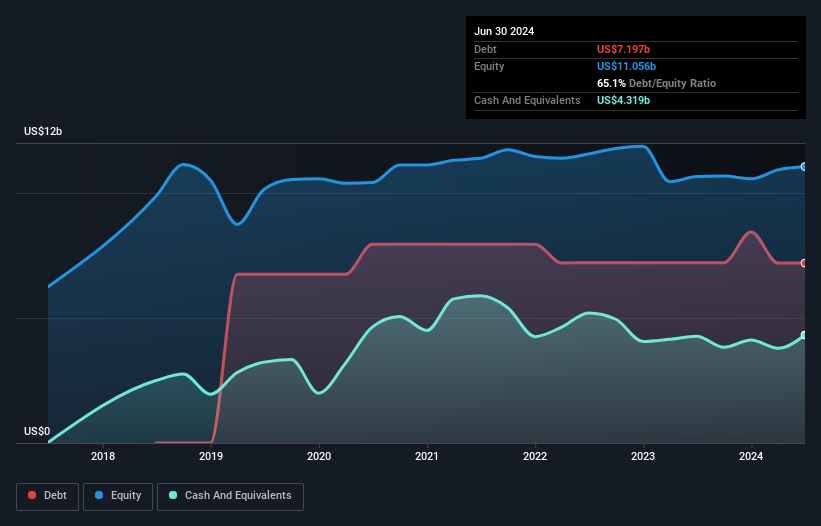
The external fund manager backed by Berkshire Hathaway's Charlie Munger, Li Lu, makes no bones about it when he says 'The biggest investment risk is not the volatility of prices, but whether you will suffer a permanent loss of capital.' It's only natural to consider a company's balance sheet when you examine how risky it is, since debt is often involved when a business collapses. We can see that Fox Corporation (NASDAQ:FOXA) does use debt in its business. But is this debt a concern to shareholders?
When Is Debt A Problem?
Debt and other liabilities become risky for a business when it cannot easily fulfill those obligations, either with free cash flow or by raising capital at an attractive price. If things get really bad, the lenders can take control of the business. While that is not too common, we often do see indebted companies permanently diluting shareholders because lenders force them to raise capital at a distressed price. Of course, the upside of debt is that it often represents cheap capital, especially when it replaces dilution in a company with the ability to reinvest at high rates of return. The first step when considering a company's debt levels is to consider its cash and debt together.
View our latest analysis for Fox
What Is Fox's Debt?
As you can see below, Fox had US$7.20b of debt, at June 2024, which is about the same as the year before. You can click the chart for greater detail. However, it also had US$4.32b in cash, and so its net debt is US$2.88b.

How Healthy Is Fox's Balance Sheet?
Zooming in on the latest balance sheet data, we can see that Fox had liabilities of US$2.95b due within 12 months and liabilities of US$7.96b due beyond that. On the other hand, it had cash of US$4.32b and US$2.36b worth of receivables due within a year. So its liabilities outweigh the sum of its cash and (near-term) receivables by US$4.23b.
While this might seem like a lot, it is not so bad since Fox has a huge market capitalization of US$17.9b, and so it could probably strengthen its balance sheet by raising capital if it needed to. But it's clear that we should definitely closely examine whether it can manage its debt without dilution.
We use two main ratios to inform us about debt levels relative to earnings. The first is net debt divided by earnings before interest, tax, depreciation, and amortization (EBITDA), while the second is how many times its earnings before interest and tax (EBIT) covers its interest expense (or its interest cover, for short). This way, we consider both the absolute quantum of the debt, as well as the interest rates paid on it.
Fox has a low net debt to EBITDA ratio of only 1.0. And its EBIT covers its interest expense a whopping 11.3 times over. So we're pretty relaxed about its super-conservative use of debt. On the other hand, Fox saw its EBIT drop by 8.6% in the last twelve months. If earnings continue to decline at that rate the company may have increasing difficulty managing its debt load. There's no doubt that we learn most about debt from the balance sheet. But it is future earnings, more than anything, that will determine Fox's ability to maintain a healthy balance sheet going forward. So if you want to see what the professionals think, you might find this free report on analyst profit forecasts to be interesting.
Finally, a business needs free cash flow to pay off debt; accounting profits just don't cut it. So we clearly need to look at whether that EBIT is leading to corresponding free cash flow. During the last three years, Fox produced sturdy free cash flow equating to 59% of its EBIT, about what we'd expect. This free cash flow puts the company in a good position to pay down debt, when appropriate.
Our View
When it comes to the balance sheet, the standout positive for Fox was the fact that it seems able to cover its interest expense with its EBIT confidently. But the other factors we noted above weren't so encouraging. For example, its EBIT growth rate makes us a little nervous about its debt. When we consider all the elements mentioned above, it seems to us that Fox is managing its debt quite well. But a word of caution: we think debt levels are high enough to justify ongoing monitoring. Of course, we wouldn't say no to the extra confidence that we'd gain if we knew that Fox insiders have been buying shares: if you're on the same wavelength, you can find out if insiders are buying by clicking this link.
If, after all that, you're more interested in a fast growing company with a rock-solid balance sheet, then check out our list of net cash growth stocks without delay.
New: AI Stock Screener & Alerts
Our new AI Stock Screener scans the market every day to uncover opportunities.
• Dividend Powerhouses (3%+ Yield)
• Undervalued Small Caps with Insider Buying
• High growth Tech and AI Companies
Or build your own from over 50 metrics.
Have feedback on this article? Concerned about the content? Get in touch with us directly. Alternatively, email editorial-team (at) simplywallst.com.
This article by Simply Wall St is general in nature. We provide commentary based on historical data and analyst forecasts only using an unbiased methodology and our articles are not intended to be financial advice. It does not constitute a recommendation to buy or sell any stock, and does not take account of your objectives, or your financial situation. We aim to bring you long-term focused analysis driven by fundamental data. Note that our analysis may not factor in the latest price-sensitive company announcements or qualitative material. Simply Wall St has no position in any stocks mentioned.
About NasdaqGS:FOXA
Fox
Operates as a news, sports, and entertainment company in the United States (U.S.).
Flawless balance sheet with solid track record.
Similar Companies
Market Insights
Community Narratives




